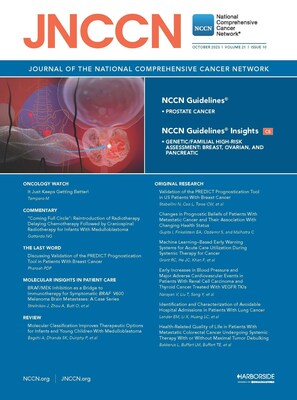Researchers found that removing as much tumor as possible in multiorgan metastatic colorectal cancer—via various methods—did not cause a decrease in quality of life despite an increase in adverse events; survival benefits remain unclear.
Researchers found that removing as much tumor as possible in multiorgan metastatic colorectal cancer—via various methods—did not cause a decrease in quality of life despite an increase in adverse events; survival benefits remain unclear.
PLYMOUTH MEETING, Pa., Oct. 12, 2023 /PRNewswire/ -- New research in the October 2023 issue of JNCCN—Journal of the National Comprehensive Cancer Network finds that intensive local-regional treatment to remove as much tumor as possible (known as "debulking"), in addition to standard systemic therapy, does not impact overall quality of life significantly for people with metastatic colorectal cancer.
The researchers examined the ongoing ORCHESTRA trial (NCT01792934) to compare patients treated with standard palliative chemotherapy alone to those who received palliative chemotherapy plus either surgery, ablative therapy, and/or radiotherapy to reduce their tumor burden. 300 patients were randomized to receive standard care or additional intervention. Significant adverse events were reported in 21% of patients in the standard group and 43% of patients who also received tumor debulking. However, there were no statistical or clinically relevant differences according to patient-reported outcomes for overall health-related quality of life or fatigue.
"This could mean that the negative impact of complications on quality of life is temporary and eventually balances out with a decrease in tumor-related symptoms after treatment. Patients might also adapt their HRQoL perceptions during the course of their disease and treatment." explained lead author Lotte Bakkerus, MD, Radboud Institute for Health Sciences, The Netherlands. "Given the considerable amount of complications from local treatment, we had expected to see a bigger impact on overall and persistent quality of life in the experimental group. The fact that local therapy associated serious side effects did not translate to a noticeable dip in the patients' perceived quality of life is quite intriguing and warrants further exploration. These results, including the risk of complications, should be taken into account in the consultation room in order to decide, together with the patient, what the right treatment choice is for each individual."
The study focused on the results from a preplanned exploratory secondary endpoint of Health-Related Quality of Life (HRQoL) from the ORCHESTRA trial, which was measured using the EORTC Quality of Life Questionnaire-Core 30 and the Multidimensional Fatigue Inventory questionnaire at pre-specified time points during treatment. The intervention group included first-line FOLFOX or CAPOX +/- bevacizumab plus multi-organ debulking to reduce the tumor by at least 80%. That was compared to the control group of palliative systemic chemo-biologic therapy only.
"Tumor debulking for patients with synchronous oligo-metastatic colorectal cancer is often utilized for curative intent and endorsed in the NCCN Guidelines, with surgical resection preferred over other acceptable treatment-modalities such as radiation therapy or thermal ablation. However, the potential survival benefits for such interventions have not been established for patients with multi-organ rather than single-organ colorectal-cancer metastases. That's a question that the ORCHESTRA trial is attempting to answer," commented Charles J. Schneider, MD, FACP, Professor of Clinical Medicine in the University of Pennsylvania Perelman School of Medicine and GI Medical Oncologist at Penn Medicine's Abramson Cancer Center.
Dr. Schneider, is a member of the NCCN Clinical Practice Guidelines in Oncology (NCCN Guidelines®) Panel for Colon/Rectal/Anal Cancers, and was not involved in this study. He continued:
"The outcome of no statistically significant or clinically relevant differences in HRQoL and fatigue after one year was surprising. More intriguing yet, is the fact that although the patients in the intervention group experienced local treatment related serious adverse events (SAEs) twice as often as patients in the standard group, there was a striking lack of association between the occurrence of SAEs and impact on HRQoL. Thus, this HRQoL 'equivalence,' even in the face of twice as many SAE's in the intervention group, should give guarded justification for multi-organ tumor debulking combined with palliative chemotherapy in select patients, if the survival data turns out to favor the intervention group as well."
To read the entire study, visit JNCCN.org. Complimentary access to "Health-Related Quality of Life in Paitents with Metastatic Colorectal Cancer Undergoing Systemic Therapy With or Without Maximal Tumor Debulking" is available until January 10, 2024.
About JNCCN—Journal of the National Comprehensive Cancer Network
More than 25,000 oncologists and other cancer care professionals across the United States read JNCCN—Journal of the National Comprehensive Cancer Network. This peer-reviewed, indexed medical journal provides the latest information about innovation in translational medicine, and scientific studies related to oncology health services research, including quality care and value, bioethics, comparative and cost effectiveness, public policy, and interventional research on supportive care and survivorship. JNCCN features updates on the NCCN Clinical Practice Guidelines in Oncology (NCCN Guidelines®), review articles elaborating on guidelines recommendations, health services research, and case reports highlighting molecular insights in patient care. JNCCN is published by Harborside/BroadcastMed. Visit JNCCN.org. To inquire if you are eligible for a FREE subscription to JNCCN, visit NCCN.org/jnccn/subscribe. Follow JNCCN on Twitter @JNCCN.
About the National Comprehensive Cancer Network
The National Comprehensive Cancer Network® (NCCN®) is a not-for-profit alliance of leading cancer centers devoted to patient care, research, and education. NCCN is dedicated to improving and facilitating quality, effective, equitable, and accessible cancer care so all patients can live better lives. The NCCN Clinical Practice Guidelines in Oncology (NCCN Guidelines®) provide transparent, evidence-based, expert consensus recommendations for cancer treatment, prevention, and supportive services; they are the recognized standard for clinical direction and policy in cancer management and the most thorough and frequently-updated clinical practice guidelines available in any area of medicine. The NCCN Guidelines for Patients® provide expert cancer treatment information to inform and empower patients and caregivers, through support from the NCCN Foundation®. NCCN also advances continuing education, global initiatives, policy, and research collaboration and publication in oncology. Visit NCCN.org for more information.
Media Contact:
Rachel Darwin
267-622-6624
darwin@nccn.org
![]() View original content to download multimedia:https://www.prnewswire.com/news-releases/more-aggressive-treatment-doesnt-impact-quality-of-life-for-metastatic-colorectal-cancer-patients-according-to-new-study-in-jnccn-301955437.html
View original content to download multimedia:https://www.prnewswire.com/news-releases/more-aggressive-treatment-doesnt-impact-quality-of-life-for-metastatic-colorectal-cancer-patients-according-to-new-study-in-jnccn-301955437.html
SOURCE National Comprehensive Cancer Network






